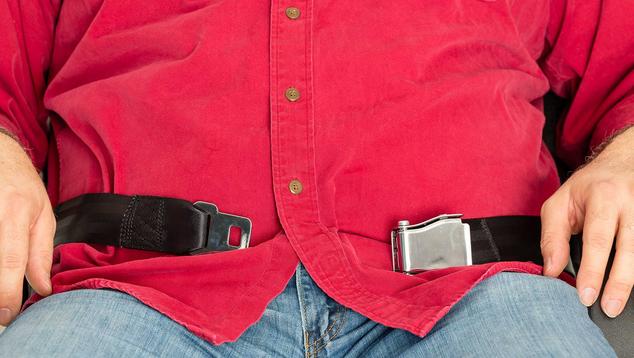Story Highlights
- Obese Americans more often experience negative emotions
- Obese Americans perceive more social bias against them
- Obese Americans report dissatisfaction with their weight
WASHINGTON, D.C. -- Obese adults in the U.S. are more likely than those with a “normal weight” ("normal" throughout this article refers to an objective body mass index (BMI) category) to experience negative emotions in their daily life and to report feeling mistreated by people in social interactions. Most also struggle with a degree of self-criticism, saying they are dissatisfied with their weight.
Obesity has increased since 2008, including sharply after the onset of the COVID-19 pandemic, to the point that 38% of Americans, up from 32% in 2019, were classified as obese in 2023, based on self-reported data on weight and height.
These findings are from a recent Gallup online poll of 12,132 U.S. adults conducted between March 25 and April 3, 2024. About half of respondents surveyed came from the probability-based Gallup Panel, and half from a nonprobability sample used to improve the survey’s coverage of hard-to-reach populations.
The Emotional Toll of Extra Weight
Extra weight can pose physical health risks, but the data show that people’s weight poses risks to their emotional state as well. In 2014, Gallup data indicated that obesity was linked to lower levels of social wellbeing. The latest data show that obesity may also be linked to lower levels of emotional wellbeing. Gallup measures people’s routine emotional life by asking if they experienced each of several negative emotions “yesterday.”
Americans who are classified as obese -- that is, having a BMI of 30 or higher -- are more likely to report having experienced negative emotions the day before the survey, as compared with those who fall into the “normal weight” category -- a BMI of 18.5 to less than 25. These negative emotions include anxiety, loneliness, anger, stress, sadness, worry and physical pain.
The differences in reported emotions between obese and normal-weight Americans, based on the standard BMI classification, are largest for the experiences of physical pain -- 20 percentage points, with 25% of normal-weight and 45% of obese Americans reporting the experience of physical pain.
Apart from physical pain, the negative emotions that obese Americans report experiencing more frequently (worry, sadness, stress, anger, loneliness and anxiety) may be exacerbated by mistreatment stemming from the cultural stigma of obesity.
Perceptions of Implicit Bias Based on Weight
The interpersonal consequences of cultural stigma attached to obesity include unfair treatment and judgment based on one’s body weight.
Americans who are categorized as obese more often report experiencing behaviors toward them that may arise out of people’s implicit or explicit biases against extra weight, a bias known as “weightism.” For example, about half (51%) of those classified as obese in the Gallup study report that in their day-to-day life over the 12 months before the survey, “people acted as if they were better than you.” Significantly fewer of those classified as normal weight, 39%, reported this experience. Obese Americans also more often reported that over this 12-month period, people acted as if they thought they were dishonest or not smart and treated them with less courtesy than others.
Americans classified as obese face more bias toward them than those who have a normal weight BMI. A statistical model (i.e., a regression analysis) confirms this is the case, even after accounting for other factors linked to higher rates of reporting bias, including race and ethnicity, gender, and economic difficulty.
Obese Americans Are Dissatisfied With Their Weight
Americans who are classified as obese overwhelmingly report being dissatisfied with their weight; 83% report being “very” or “somewhat” dissatisfied with their current body weight. Considerably fewer Americans (64%) in the “overweight” category -- a BMI of at least 25 but less than 30 -- report dissatisfaction with their body weight. Among those with a normal weight, only 33% report being “very” or “somewhat” dissatisfied with their weight.
Negative experiences that have to do with weight can be disturbing and may contribute to a sense of dissatisfaction with one’s body image and weight. For example, experiences with anxiety, physical pain or loneliness, coupled with perceived bias in social interactions, may culminate in negative attitudes about one’s body weight among obese individuals and further feed into a cycle of ill-being.
Implications: A Better Way to Understand and Address Obesity
Obesity is a complex and multifaceted problem involving cultural and emotional factors as well as physical and behavioral ones. It is not enough to address obesity by looking at what people eat, how they exercise or their genes. It is also necessary to consider how obesity interacts with demographic factors like race, gender and socioeconomic status to give rise to negative feelings that are intensified by cultural norms and biases. Efforts to address the obesity epidemic in the U.S., which increased sharply after 2018, need to address mental health and weightism in addition to physical health. This requires the attention and cooperation of various stakeholders -- including the healthcare and pharmaceutical industries, mental health clinicians and even the education industry -- all of which can play a major role in raising awareness about cultural biases against obesity.
To stay up to date with the latest Gallup News insights and updates, follow us on X @Gallup.
Learn more about how the Gallup Panel works.




